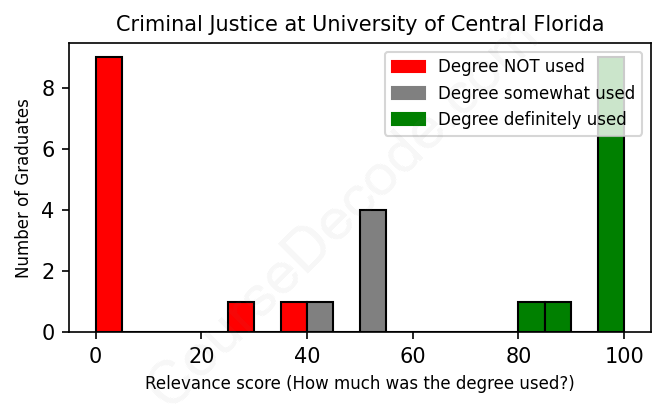
First, some facts. Of the Criminal Justice graduates from University of Central Florida we've analyzed , here's how many have used (or NOT used) their degree in their career:

These are estimates based on AI analysis of 27 LinkedIn profiles (see below).
The verdict? Significantly below average. Overall, with an average relevance score of 50%, Criminal Justice graduates from University of Central Florida have a much lower likelihood (-17%) of finding work in this field compared to the average graduate across all fields:
And for comparison, here's the chart for all profiles we've looked at across all degrees.
Also, after graduating, 48% of these graduates have pursued further education other than another Bachelor's degree (such as a Masters degree or other), compared to the average across all profiles of 35%. This suggests you may need more than just a Bachelors degree to be competitive as a Criminal Justice graduate.
See the details:
|
Relevance score: 0% We think this person has NOT gone into a career related to their degree. We think this person has NOT gone into a career related to their degree.
DEGREE INFOGraduated in 2022 from University of Central Florida with a Bachelor of Arts - BA in Criminal Justice. No other secondary education since. JOB HISTORY SINCE GRADUATIONCertified Debt Specialist Beyond Finance May 2024 - Present ABOUT. |
The top 10 most common jobs done by the graduates we've analyzed (ranked most common to least) are:
When looking at the job profiles of graduates from the University of Central Florida with a degree in Criminal Justice, it’s interesting to see a mix of career paths. A significant number of graduates have landed roles in law enforcement, including positions like Deputy Sheriff and Police Officer, which are highly relevant to their degree. These jobs require a strong application of criminal justice knowledge and skills, enabling them to directly impact their communities. Additionally, some graduates have taken up roles in legislative positions, such as Legislative Assistant or Legislative Director, where their understanding of criminal justice policy is crucial for their work in shaping laws and regulations.
However, not all paths are directly related to criminal justice. Many graduates have pursued careers in unrelated fields, like marketing, sales, and customer service. These roles typically do not require the specialized knowledge gained from a Criminal Justice degree. For instance, positions in fields such as human resources or business management seem to stray far from the core principles of criminal justice. Even among those working in roles that demand some understanding of social issues—like communications or public relations—the direct application of criminal justice knowledge can be quite minimal. Overall, while there are clear connections for many graduates to their criminal justice backgrounds, a noticeable number veer into professions where their degree has limited relevance.
Here is a visual representation of the most common words in job titles for Criminal Justice graduates (this is across all Criminal Justice graduates we've analyzed, not just those who went to University of Central Florida):

When looking at the career trajectories of graduates with a Criminal Justice degree from the University of Central Florida, it’s evident there’s a mix of paths taken after graduation. Generally, many of them started out in law enforcement or related fields, like those who became police officers or correctional officers shortly after finishing their degree. For instance, several graduates quickly took on roles such as Deputy Sheriff or Correctional Officer. This shows that a good number of them found jobs relevant to their studies right after graduating, which is a positive sign if you’re interested in a career directly connected to Criminal Justice.
However, as time has gone on, the picture becomes a bit more varied. While some alumni have continued climbing the ranks in law enforcement or have transitioned into specialized roles like investigators, others have drifted toward entirely different fields that aren’t closely related to Criminal Justice. We see people moving into roles like sales, project management, and even marketing after several years. So while many graduates kick off their careers in criminal justice-related roles right out of school, it's important to note that as time goes on, some seem to pursue paths that stray from their original career focus. This highlights the importance of flexibility and the potential for diverse career opportunities, whether or not they align perfectly with what they studied in college.
Getting a Bachelor’s degree in Criminal Justice at the University of Central Florida is generally considered to be on the easier side compared to some other majors, but that doesn’t mean it’s a walk in the park. You’ll dive into a mix of theory, criminology, and the ins and outs of the legal system, which can be really interesting if you’re passionate about the topic. The workload isn’t as intense as, say, engineering or nursing programs, but you’ll still need to put in consistent effort, especially with research papers and group projects. Overall, if you stay organized and engaged, you should do just fine!
Most commonly, in the LinkedIn profiles we've looked at, it takes people 2 years to finish a Bachelor degree in Criminal Justice.
Looking at the career paths of these Criminal Justice grads from UCF, it seems like they’ve generally found decent job stability but the money they’re making varies a lot. The first grad, for instance, started with a government job that probably paid reasonably well and then opened their own business, which can be hit or miss financially. Others took internships and entry-level jobs in fields like communications or law enforcement, which can be less lucrative at first. You’ve got some grads who are working in higher-level positions like Deputy Sheriff or communications roles that likely pay better, but there are also folks in retail and entry-level jobs, which typically don’t pay as much. In short, it looks like while some are on a solid financial path, others are still working their way up and might not be raking in the cash just yet!
Here is a visual representation of the most common words seen in the "about" section of LinkedIn profiles who have a Bachelor degree in Criminal Justice (this is across all Criminal Justice graduates we've analyzed, not just those who went to University of Central Florida). This may or may not be useful:

Here are all colleges offering a Bachelor degree in Criminal Justice (ordered by the average relevance score of their Criminal Justice graduates, best to worst) where we have analyzed at least 10 of their graduates: